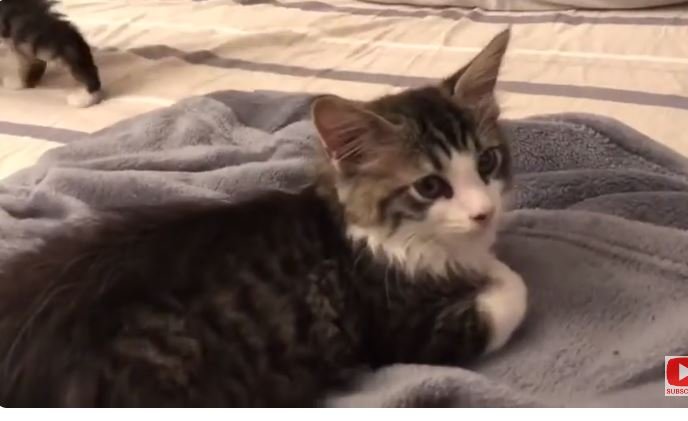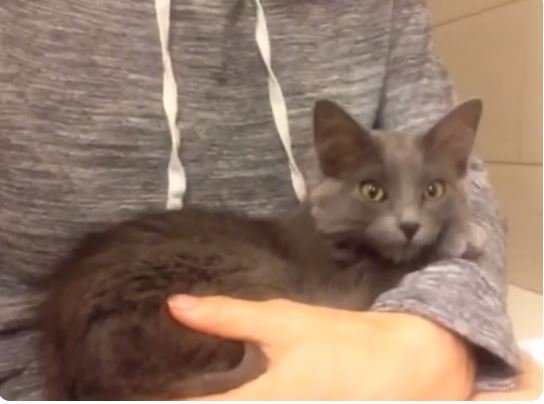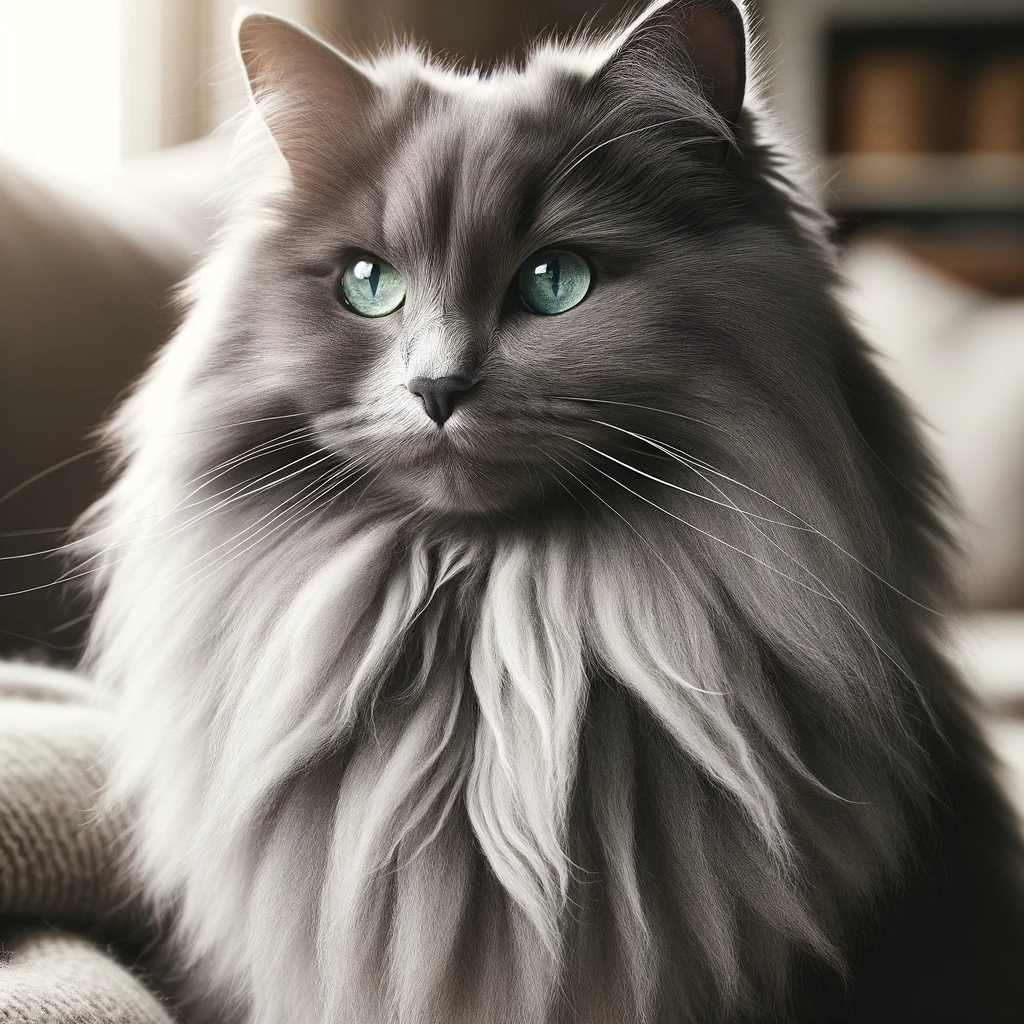The Russian Blue Ragdoll mix is a captivating blend of two of the most cherished domestic cat breeds. This hybrid feline inherits the striking beauty and serene temperament of the Russian Blue, along with the affectionate and gentle nature of the Ragdoll.
In this comprehensive guide, we’ll explore the unique personality traits, temperament, and other fascinating aspects of the Russian Blue Ragdoll mix, providing cat enthusiasts with an in-depth look at this extraordinary breed.
Russian Blue Ragdoll Mix Breed Overview
| Feature | Description |
|---|---|
| Breed Name | Russian Blue Ragdoll Mix |
| Average Weight | 10-15 pounds |
| Coat Type | Dense, plush, and soft; potential for semi-long hair |
| Coat Color | Silvery-blue to gray with possible white or cream patterns |
| Eye Color | Vivid green to blue |
| Lifespan | 12-20 years |
| Temperament | Affectionate, intelligent, reserved with strangers |
| Allergenic Potential | Moderate; produces fewer allergens than some breeds |
| Activity Level | Moderate; enjoys play but also appreciates relaxation |
| Grooming Needs | Moderate; regular brushing required |
| Suitability | Ideal for families, singles, and seniors looking for a loyal companion |
The Genesis of Grace: Origins of the Russian Blue Ragdoll Mix
Before delving into the specifics of the Russian Blue Ragdoll mix, it’s essential to understand the lineage of these two breeds. The Russian Blue, with its shimmering blue-grey coat and vivid green eyes, hails from the northern regions of Russia. Known for their intelligence and reserved nature, Russian Blues are a natural breed with a regal bearing. On the other hand, the Ragdoll, developed in the 1960s in California, is celebrated for its striking blue eyes and plush coat. Ragdolls are one of the largest domestic cat breeds, renowned for their docile and affectionate demeanor.
When these two breeds are crossed, the resulting Russian Blue Ragdoll mix is a cat of moderate size with a luxurious coat, often inheriting the mesmerizing eye color of the Ragdoll and the silvery-blue hue of the Russian Blue.
Physical Characteristics
The Russian Blue Ragdoll mix typically boasts a medium to large build, reflecting the substantial size of the Ragdoll parent and the sleek physique of the Russian Blue. Their coat is a luxurious blend of the Russian Blue’s dense, plush fur and the Ragdoll’s semi-long, silky strands, often resulting in a striking blue-grey color with silver tips.
Their eyes are a captivating feature, with most mixes inheriting the deep blue of the Ragdoll, though some may display the green or yellow-green shades characteristic of the Russian Blue. This mix’s physical allure is undeniable, with a poised elegance that enchants all who encounter them.

Personality and Temperament
The Russian Blue Ragdoll mix is a harmonious combination of the two breeds’ best personality traits. They often exhibit the Russian Blue’s intelligence and playful curiosity alongside the Ragdoll’s affectionate and laid-back nature. These cats are known for their sociability and loyalty, forming strong bonds with their human companions. They may display a preference for one family member but will show love and affection to the entire household.
The Russian Blue Ragdoll mix is typically good-natured and patient, making them excellent companions for families with children and other pets.
A Serene Companion: Behavior and Socialization
Russian Blue Ragdoll mixes tend to be gentle and calm, often seeking out the company of their humans. They enjoy interactive play and mental stimulation but are equally content to lounge in a sunny spot or curl up in a lap for a cozy nap. Socialization is crucial for this mix, as it helps them become well-adjusted and confident.
Introducing them to various people, pets, and environments from a young age will ensure they grow into sociable and outgoing adults. Positive interactions and playtime will reinforce their friendly nature and prevent any potential shyness inherited from the Russian Blue side.
The Purrfect Health: Common Health Concerns
While the Russian Blue Ragdoll mix is generally a healthy breed, they may inherit health concerns from their parent breeds. Regular veterinary check-ups are essential to monitor for conditions such as hypertrophic cardiomyopathy (HCM) and polycystic kidney disease (PKD), which can affect both Russian Blues and Ragdolls.
Obesity can also be a concern, particularly if they inherit the Russian Blue’s hearty appetite. A balanced diet and regular exercise are key to maintaining their health and preventing weight-related issues.
Grooming the Silken Shadow: Maintenance and Care
The Russian Blue Ragdoll mix’s coat requires regular grooming to maintain its luxurious texture and minimize shedding. Weekly brushing will help remove loose hair and prevent matting, while also providing a bonding experience between cat and owner.
Dental hygiene is another important aspect of their care. Regular teeth brushing or providing dental treats can help maintain oral health and prevent gum disease. Nail trimming and ear cleaning should also be part of their routine care to ensure they remain in tip-top shape.

Training the Tranquil Treasure: Tips and Techniques
Despite their laid-back nature, the Russian Blue Ragdoll mix is quite trainable. They respond well to positive reinforcement methods such as treats and praise. Training sessions should be short and engaging to keep their interest and capitalize on their intelligence. Teaching them basic commands and tricks not only provides mental stimulation but also strengthens the bond between cat and owner.
Consistency and patience are key when training this mix, as they may display the Russian Blue’s independent streak at times.
The Quiet Observer: Behavioral Quirks
The Russian Blue Ragdoll mix may inherit the Russian Blue’s tendency to be reserved around strangers and new situations. They may take time to warm up to guests but will eventually show their affectionate side once they feel comfortable. They may also display the Ragdoll’s characteristic “floppiness” when picked up, going limp in their owner’s arms in a display of trust and contentment. This endearing trait is a testament to their gentle and trusting nature.
The Loyal Shadow: Companionship and Bonding
This mix thrives on companionship and prefers not to be left alone for extended periods. They may follow their favorite person around the house, seeking attention and interaction. Providing them with toys and activities can help keep them entertained when their humans are away.
Bonding with a Russian Blue Ragdoll mix involves regular playtime, grooming sessions, and simply spending quality time together. They cherish the presence of their family and will often be found in the same room, quietly observing or seeking out a lap to snuggle on.
FAQs:
Are Russian Blue Ragdoll mixes good for families with children?
Yes, their gentle and patient nature makes them well-suited for families with children. They enjoy affection and can be quite playful, making them a delightful addition to a household with kids.
How much grooming does a Russian Blue Ragdoll mix require?
They require weekly brushing to keep their coat in good condition and to reduce shedding. They may also need occasional baths, nail trimming, and dental care as part of their grooming routine.
Can Russian Blue Ragdoll mixes adapt to apartment living?
Yes, they can adapt well to apartment living as long as they have enough space to play and explore. They appreciate a quiet and stable environment, which is often found in apartment settings.
Do Russian Blue Ragdoll mixes get along with other pets?
Generally, they get along with other pets, especially if socialized from a young age. Their friendly and non-aggressive demeanor allows them to coexist peacefully with other cats and even dogs.
How long do Russian Blue Ragdoll mixes live?
With proper care, a Russian Blue Ragdoll mix can live anywhere from 12 to 20 years. Regular veterinary care and a healthy lifestyle contribute to their longevity.
Conclusion:
The Russian Blue Ragdoll mix is a breed that exudes elegance, intelligence, and affection. Their serene presence and loving nature make them an ideal companion for those seeking a loyal and beautiful feline friend. By understanding their needs and providing them with the care they deserve, you can ensure a

Hey guys, My name is Simon Smith. I’m from Canada and live near Victoria
I live with my sweet family and have 20+ Ragdolls of different types. I love them as my own children. My profession is as a hotel manager.
I love to keep Ragdolls and grow their breeder case. I have 7 years of experience.
I’m an expert in cat care. So, I’m here to provide you with new information about my cats daily. This is my personal blog website, so I request that you kindly visit our site daily.
If you’re a Ragdolls lover and you have any questions or confusion about cats, text me on the Contact Us page or Gmail.
Thank u
